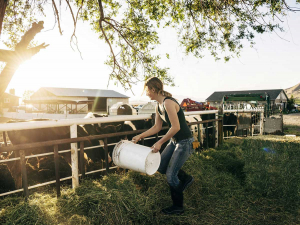Wired for Science: Understanding the feeding habits of mealybug
Fussy children might be frustrating, but fussy mealybugs could help protect the New Zealand wine industry from grapevine leafroll-associated virus 3.
 Primary production tends to create more anxiety amongst farm managers compared to other occupations.
Primary production tends to create more anxiety amongst farm managers compared to other occupations.
New Lincoln University research shows analysing a farmer’s personal characteristics is important when dealing with their anxiety.
Research report authors Bruce Greig, Dr Peter Nuthall and Dr Kevin Old say a farmer’s personality, objective set, belief in their ability to control outcomes, as well as education and age were among factors highly related to anxiety.
Nuthall said the past approach to dealing with anxiety has been through utilising coping mechanisms such as sharing with significant others.
“A problem has also been farmers’ reluctance to voice difficulties and seek helpers.
“An analysis of personal characteristics provides the information required to direct counselling efforts to modify the anxiety creating personal variables and, consequently, reduce anxiety and its impact on thinking.”
A random survey of New Zealand farmers was used to obtain their ratings on their anxiety.
He said the nature of primary production tended to create more anxiety amongst farm managers relative to other occupations. They must cope with uncertain, and often extreme, weather, product prices, input prices, government regulations and rules, as well as employment issues under the close employer/ee relationships on farms, and also plant and animal disease vagaries.
“There is also evidence that concern over climate change is increasing anxiety through disrupting farmers’ sense of place, particularly as the farmers’ work place is, frequently, also their home.”
Counselling and psychotherapy can have very positive impacts and are likely to change basic farmer characteristics (which also change with age and related factors), he said.
“Effectively, this is a further approach with the farmer using her/his own resources to modify basic characteristics with family and community support.
“However, this probably requires education and training if the farmer is to understand the problem and possible solution methods. These might be supplied through extension and written media.
Similarly the use of meditation has been shown to be helpful in some cases.
“It is also clear, no matter which approach is taken, there is a need to remove the perceived stigma attached to seeking help. This can only come from further general education and extension work pointing out that anxiety is normal and ‘assistable’,” Nuthall said.
Donald Trump's latest tariff tantrum has again thrown the world of trade into a new round of turmoil and uncertainty, and NZ is caught up in it.
The third edition of the NZ Dairy Expo, held in mid-February in Matamata, has shown that the KISS principle (keep it simple stupid) was getting a positive response from exhibitors and visitors alike.
Twenty years ago, South African dairy farm manager Louis Vandenberg was sent to a farm in Waikato to provide training on Afimilk technology.
Strong farmgate milk price is helping boost investment on farms, says PGG Wrightson chief executive Stephen Guerin.
Fonterra's 460 milk suppliers in Australia, who will switch to Lactalis end of this month, are unfazed with the impending change.
The 5+ A Day Charitable Trust has launched a collection of affordable recipes designed to turn everyday vegetables into seasonal stars.
OPINION: Staying with politics, with less than nine months to go before the general elections, there’s confusion in the Labour…
OPINION: Winston Peters' tirade against the free trade deal stitched with India may not be all political posturing by the…